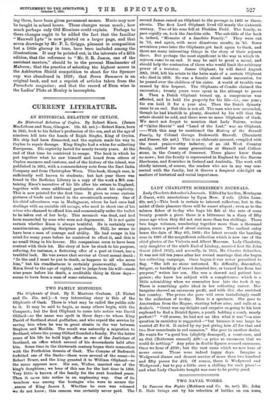CURRENT LITERATURE.
AN HISTORICAL RELATION OF CEYLON.
An Historical Relation of Ceylon. By Robert Knox. (James MacLehose and Sons, Glasgow. 12s. 6d. net.)--Robert Knox, born in 1641, took to his father's profession of the sea, and at the age of nineteen fell into the hands of Rajah Singho, King of Ceylon. His ship had been dismasted, and the captain made his way to Ceylon to repair damage. King Singho had a whim for collecting Europeans. His captivity lasted for nearly twenty years. At the end of that time he contrived to escape. The book in which he put together what he saw himself and heard from others of Ceylon manners and customs, and of the history of the island, was published in 1681, with a commendatory note from the East India Company and from Christopher Wren. This book, though rare, is sufficiently well known to students; but last year there was found in the Bodleian Library in a copy of the work a MS. con- taining Knox's narrative of his life after his return to England, together with some additional particulars about his captivity. This is now printed for the first time. It gives us some curious pictures of trade and travel in the seventeenth century. One of his chief adventures was in Madagascar, where he had once had dealings with an amiable old savage, who used to shoot one of his wives who chanced to offend him and economically order the bullet to be taken out of her body. This monarch was dead, and had been succeeded by sons who were not degenerate. It is not quite certain whether Knox is always truthful. He is certainly very sanctimonious, quoting Scripture profusely. Still, he seems to have been a man of courage and ability. He had escape in his mind for many years before he contrived to effect it, and this is no small thing in his favour. His companions seem to have been content with their lot. His story of how he stuck to his purpose, refusing, for instance, a flattering offer of a post at Court, has a truthful look. He was aware that service at Court meant death : "In the end I must be put to death, as happens to all who serve him," but his steadfastness is certainly praiseworthy. Robert Knox lived to the age of eighty, and to judge from his will—made nine years before his death, a creditable thing in those days— seems to have been a man of some substance.






























































 Previous page
Previous page